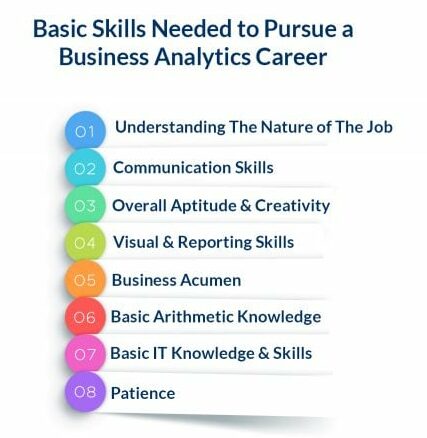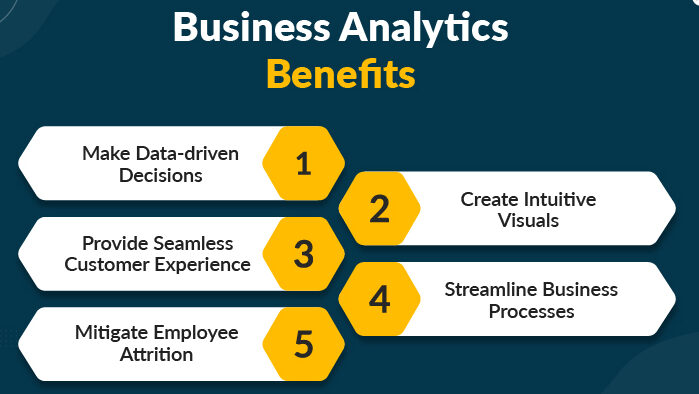Business Analytics: Why It Matters in 2025
Table of Contents

Have you ever noticed how major successful decisions taken are always backed by data? From designing marketing campaigns to planning proper supply chain the importance of business analytics cannot be denied.
In 2025, it has become a necessity for business organizations to collect data from all their customer touchpoints. This data collected plays a very important role in shaping their strategies, predicting future trends and helps them gain an edge in this rapidly evolving world.
This just shows that understanding the importance of business analytics is not something optional or extra; it is a necessity for businesses willing to grow.
What is Business Analytics?
When one needs to understand the importance of business analytics it is most important that they start by learning the business analytics meaning, answering the question, what is business analytics?
To answer this question simply, business analytics is practice of using the raw data or numbers available, analysing it using statistical methods and predictive models to convert it into informed decisions for your business.
The process blends technology, process and business expertise turning raw data into valuable insights.
The Basics of Business Analytics

*analytixlabs.co.in
Knowing the basics of business analytics is another step towards understanding the needs and importance of business analytics. This includes making sense of different numbers and data that the business collects on a regular basis.
You can think of it as an exercise of trying to figure out what the numbers are trying to tell you and bridge the gap between the condition of your organization right now and its final goals. It starts with collecting data sales figures, customer feedback, website activity and then using tools to spot specific patterns and trends.
It’s not just about numbers. It’s about understanding the story those numbers tell. For example, if sales are dipping in one region you should start by going through its data and analysing it. This can help you figure out why that is happening. Is it a seasonal shift, a competitor’s move or a change in customer preferences? That’s the importance of business analytics.
This is also where business analytics and data science meet. While data science often focuses on creating complex models and exploring vast datasets, business analytics focuses on applying those insights to solve real-world business problems.
The Importance of Business Analytics in 2025

*selecthub.com
The importance of business analytics isn’t just about numbers or fancy charts. It’s about making choices that feel right because they’re backed by real insight. It’s the quiet power behind smarter decisions, happier customers, and businesses that keep moving forward.
Driving Data-Driven Decisions
If you’ve ever had to make a big decision at work and felt like you were just… guessing what you need to do, you’ll understand well why data-driven decisions matter. In 2025, the “let’s go with our gut” approach just doesn’t cut it anymore. Things are moving too fast, and the cost of being wrong is way too high.
Business analytics steps in like a friend who always has receipts. Instead of starting with “I think”, you start with “the data shows”. This also helps you to prove and convince people to agree with your decision. It’s the difference between stumbling in the dark and switching on a light. Sales numbers, customer feedback, website clicks, analytics pulls all those scattered pieces together and shows you the bigger picture.
The importance of business analytics increases when you’re launching a new product. Without data, you might pick a market at random, but with analytics, you know exactly which market is hungry for it, what price point works and even which features will make people talk.
You’re not replacing your judgement; you’re backing it up with proof. And that means when you make a move, you can do it with confidence, not crossed fingers.
Gaining Competitive Advantage
Here’s the thing: every business is chasing the same customers and those customers are more informed than ever. They have options. Lots of them. If you want to stand out you can’t just react to market trends and hope you stay unharmed and make it into an opportunity. You have to see what’s coming before it hits.
That’s where the importance of business analytics really shows up. It’s like having binoculars when everyone else is squinting. Analytics lets you spot the little shifts. Maybe people are suddenly talking about eco-friendly packaging or a certain product category is trending on social media. You see it early, make your move and by the time competitors catch on you’re already there.
Importance of business analytics lies in not just being faster, but being smarter. You’re need to make choices that are rooted in real data. That could mean adjusting pricing before a downturn, launching a new product line just ahead of demand or simply avoiding a costly mistake others didn’t see coming. In a crowded market those who are smart and move early are the ones who make the difference between leading and catching up.
Improving Operational Efficiency
If you have ever waited way too long in a checkout line or had a delivery show up weeks late you know how frustrating inefficiency feels. For a business it’s not just annoying it’s expensive.
The process of business analytics is like putting on a pair of glasses that suddenly make all the blurry bits of your operations crystal clear. It digs into the details where delays happen, where resources are wasted, where teams are doing double the work without realising it. Sometimes the issues are obvious but a lot of the time they’re buried in the day-to-day hustle.
Imagine finding out your busiest customer service hours don’t match your staff schedule or your production line slows down every Friday afternoon for no clear reason. Analytics doesn’t just point at the problem. It helps you figure out the fix. Over time those small fixes stack up fewer delays, happier customers, less wastage and more energy for the projects that actually move the business forward.
Predicting Market Trends
Knowing what’s happening now is wonderful. But in business, you need to keep an eye out for what’s about to happen. That’s real ability to stay afloat and profitable as a business.
This is where analytics shifts from being “useful” to “game-changing”. By looking at historical data, spotting patterns, and combining it with current signals, it helps you predict what’s around the corner. Maybe a fashion retailer sees a certain colour selling unusually well in a city. Maybe a travel company notices more early bookings for winter holidays than usual. These aren’t just random quirks; they’re clues.
Acting on those clues means you can prepare ahead. You can stock up, plan campaigns, or roll out products before everyone else. Instead of scrambling to catch up when a trend explodes, you’re already in position. And customers notice. They think, “Wow, they always have exactly what I want, when I want it.” That’s not luck; it’s the importance of business analytics.
Better Customer Experience
At the end of the day, business is about people. And people want to feel understood. They don’t want generic offers or one-size-fits-all products; they want something that feels made for them. Business analytics makes that possible.
It watches for the little things that customers buy, what they browse, when they tend to shop, and what they’ve complained about before. It’s not about being creepy. It’s about paying attention. When you use that knowledge to tailor experiences, like recommending a show they’ll actually enjoy or offering a discount right when they’re considering a purchase, it makes people feel valued.
And here’s the magic: when customers feel valued, they stick around. They even buy more. They tell their friends. They turn into advocates for your brand. The need for business analytics here isn’t just about boosting sales; it’s about building relationships.
The Need for Business Analytics Across Industries
No matter the industry, one thing’s the same: everyone is chasing smarter, faster, and better ways to work. And that’s where the importance of business analytics comes in.
Retail & E-commerce
You remember the push notifications that are so relatable and ads that magically appear everywhere after that one mention? Retailers use the process of business analytics to read buying patterns like a book, spotting your needs, suggesting products, and keeping just the right amount of stock on hand.
Healthcare
In healthcare, analytics is literally saving lives. Hospitals use it to predict disease outbreaks, manage their staff and resources better, and personalise treatment plans.
Finance
Banks and financial firms have always dealt in numbers, but analytics takes it further. It spots unusual patterns to flag fraud before it causes damage, helps fine-tune investment strategies, and makes risk management less about gut feeling and more about solid evidence.
Logistics & Supply Chain
Here business analytics helps one to map out the most efficient delivery routes, helps cut delays and predicts demand so warehouses stay stocked without overfilling.
Conclusion
The importance of business analytics goes far beyond just numbers. Organizations everywhere are searching for people who can turn data into information and practical methods that can be acted upon. This means high demand, strong earning potential, and opportunities in almost every field, including marketing, finance, healthcare, supply chain, and more. Analytics skills don’t just make you valuable. They put you at the centre of strategic conversations that shape a company’s future.
If you’re ready to take that step, we at Jaro Education can connect you with programs like the Post Graduate Certification Programme in Business Analytics & Applications- IIM Tiruchirappalli. The program is more than just learning tools. It’s about understanding how to apply them to real business challenges. Supported by expert guidance and a strong alumni network, the course is perfect for you to begin.
Beyond the people who can bridge data and decisions will be the ones driving change. The question is, are you ready to be one of them?
Frequently Asked Questions
How does the business analytics impact long-term business growth?
Business analytics helps you in turning data into actionable strategies and analytics which helps businesses make better investments, adapt quickly to market shifts and plan for sustainable growth instead of short-term wins.
Can the importance of business analytics be applied in non-technical fields?
Yes, from human resource management to sales, analytics can improve planning, track performance and uncover insights that don’t require deep coding or technical expertise.
How is the business analytics changing leadership roles?
Leaders today are expected to make evidence-based decisions. Those who understand analytics can guide teams more effectively, justify strategies with data and inspire confidence across the organization.
What future trends will shape the importance of business analytics?
By 2025, business analytics will be characterized by deeper AI integration, with real-time decision-making and predictive analytics becoming standard practice. Businesses will increasingly depend on analytics to offer personalized experiences and maintain a competitive edge in rapidly evolving markets.

















